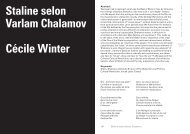Reflections on the Meaning of Stalinism Paul Le Blanc
blanc
blanc
Create successful ePaper yourself
Turn your PDF publications into a flip-book with our unique Google optimized e-Paper software.
“informative and generally accurate” account <strong>of</strong> <strong>Le</strong>nin’s life and thought,<br />
absolutely partisan yet relatively free from “pers<strong>on</strong>al acrim<strong>on</strong>y or<br />
exaggerated polemics,” and overall “admirably h<strong>on</strong>est and detached”<br />
– as her biographer Robert H. McNeal aptly describes it. Appearing in<br />
<strong>the</strong> early 1930s, before <strong>the</strong> most murderous <strong>of</strong> Stalin’s policies would<br />
close <strong>of</strong>f <strong>the</strong> possibility <strong>of</strong> even its partially-muted h<strong>on</strong>esty, it is a truly<br />
courageous book. An educated Marxist and experienced revoluti<strong>on</strong>ary,<br />
she was determined to tell as much <strong>of</strong> <strong>the</strong> truth as she was able about<br />
<strong>the</strong> development <strong>of</strong> <strong>Le</strong>nin’s revoluti<strong>on</strong>ary perspectives, with extensive<br />
attenti<strong>on</strong> to his writings and activities, and to <strong>the</strong> c<strong>on</strong>texts in which <strong>the</strong>se<br />
evolved. Within a few years, like so many o<strong>the</strong>rs, she felt compelled to<br />
capitulate utterly and completely and shamefully in support <strong>of</strong> Stalin’s<br />
worst policies. As Haupt <strong>on</strong>ce put it, “<strong>the</strong>re is still much that is left<br />
unsaid <strong>on</strong> <strong>the</strong> drama <strong>of</strong> her life, <strong>on</strong> <strong>the</strong> humiliati<strong>on</strong> she underwent.” But<br />
<strong>the</strong> memoir <strong>of</strong> her closest comrade remains as a m<strong>on</strong>ument to <strong>the</strong> best<br />
that she had to give over many years, and as an invaluable (in some ways<br />
unsurpassed) source <strong>on</strong> <strong>the</strong> life and thought <strong>of</strong> <strong>Le</strong>nin. 16<br />
If Krupskaya’s understanding <strong>of</strong> <strong>Le</strong>nin is accurate, what Stalin and<br />
such co-thinkers as Molotov meant by “<strong>Le</strong>ninism” is something o<strong>the</strong>r<br />
than <strong>the</strong> <strong>the</strong>ory and practice <strong>of</strong> <strong>Le</strong>nin.<br />
Historical Analysis<br />
The questi<strong>on</strong> naturally arises regarding how it was possible<br />
– within a collective leadership ga<strong>the</strong>red around <strong>Le</strong>nin, involving a<br />
number <strong>of</strong> str<strong>on</strong>g pers<strong>on</strong>alities with keen intellects and c<strong>on</strong>siderable<br />
political experience – that Stalin turned out to be <strong>the</strong> <strong>on</strong>e who would<br />
authoritatively decide what was genuine “<strong>Le</strong>ninism.” How was it that<br />
this particular pers<strong>on</strong>ality would be able to play such a distinctive and<br />
defining role in <strong>the</strong> chaotic and desperate swirl <strong>of</strong> events?<br />
One key involved <strong>the</strong> newly created positi<strong>on</strong>, in 1922, <strong>of</strong> General<br />
Secretary <strong>of</strong> <strong>the</strong> Russian Communist Party. The premature death <strong>of</strong> <strong>the</strong><br />
seas<strong>on</strong>ed and reliable organizati<strong>on</strong> man, Jacob Sverdlov, eliminated<br />
<strong>the</strong> man meant for <strong>the</strong> job. Ano<strong>the</strong>r politically modest organizati<strong>on</strong> man<br />
<strong>of</strong> proven reliability took his place – Joseph Stalin. Stalin oversaw <strong>the</strong><br />
growing bureaucratic apparatus that was supposed to help carry out <strong>the</strong><br />
decisi<strong>on</strong>s <strong>of</strong> <strong>the</strong> old Bolshevik leadership and <strong>the</strong> Soviet workers’ state.<br />
But <strong>the</strong> apparatus in which Stalin played a central role, c<strong>on</strong>centrating<br />
in its hands power and material privileges, became dominant over both<br />
party and state.<br />
It would have been impossible for Stalin, by himself, to have<br />
gained c<strong>on</strong>trol <strong>of</strong> <strong>the</strong> Russian Communist Party and initiate <strong>the</strong> fateful<br />
“revoluti<strong>on</strong> from above.” But after <strong>the</strong> Communists took political power,<br />
amid <strong>the</strong> rising crescendo <strong>of</strong> civil war and foreign interventi<strong>on</strong>, a powerful<br />
C<br />
R<br />
I<br />
S<br />
I<br />
S<br />
&<br />
C<br />
R<br />
I<br />
T<br />
I<br />
Q<br />
U<br />
E<br />
/<br />
Volume 3 /<br />
Issue 1<br />
Red Army and an extensive secret police apparatus (first called <strong>the</strong><br />
Cheka, later <strong>the</strong> GPU, <strong>the</strong>n <strong>the</strong> NKVD, and eventually <strong>the</strong> KGB) were<br />
established. In additi<strong>on</strong>, so-called “war communism” measures were<br />
carried out through which <strong>the</strong> Communists established state ownership<br />
and c<strong>on</strong>trol <strong>of</strong> <strong>the</strong> ec<strong>on</strong>omy.<br />
These things, combined with <strong>the</strong> growing array <strong>of</strong> social and<br />
cultural services, resulted in <strong>the</strong> rise <strong>of</strong> a vast governmental bureaucracy<br />
to oversee and coordinate <strong>the</strong> activities <strong>of</strong> <strong>the</strong> military, repressive,<br />
ec<strong>on</strong>omic, social, and cultural instituti<strong>on</strong>s. The Communist Party sought<br />
to maintain c<strong>on</strong>trol <strong>of</strong> <strong>the</strong> bureaucracy, but this was complicated because<br />
its membership became dramatically enlarged after <strong>the</strong> 1917 revoluti<strong>on</strong>,<br />
in part by many people who were motivated less by revoluti<strong>on</strong>ary idealism<br />
than by <strong>the</strong> desire to gain whatever privileges would be forthcoming<br />
to <strong>the</strong> “winning side.” As General Secretary <strong>of</strong> <strong>the</strong> Communist Party,<br />
Stalin oversaw <strong>the</strong> internal functi<strong>on</strong>ing <strong>of</strong> <strong>the</strong> party and also assignments<br />
<strong>of</strong> party members to positi<strong>on</strong>s within <strong>the</strong> swelling governmental<br />
bureaucracy. This gave him immense power and influence that at first<br />
was not fully understood by many <strong>of</strong> his more prominent comrades. 17<br />
The skills and habits developed by his many years in <strong>the</strong><br />
revoluti<strong>on</strong>ary underground, sharpened amidst <strong>the</strong> brutalizing experiences<br />
<strong>of</strong> <strong>the</strong> civil war, had made Stalin “a formidable master <strong>of</strong> <strong>the</strong> techniques<br />
<strong>of</strong> accumulating power,” notes biographer Robert C. Tucker. “His<br />
secretiveness, capacity to plan ahead, to c<strong>on</strong>spire, to dissimulate, and to<br />
size up o<strong>the</strong>rs as potential accessories or obstacles <strong>on</strong> his path, stood<br />
him in good stead here.” What was essential to understanding <strong>the</strong> man,<br />
however, is that “power for power’s own sake was never his aim,” but<br />
ra<strong>the</strong>r “a never-ending endeavor to prove himself a revoluti<strong>on</strong>ary hero.” 18<br />
Seemingly modest, and projecting himself as <strong>Le</strong>nin’s most loyal follower,<br />
Stalin sought alliances, against those challenging his power, with <strong>on</strong>e<br />
leading old Bolshevik after ano<strong>the</strong>r. And <strong>on</strong>e after ano<strong>the</strong>r, old Bolshevik<br />
leaders found <strong>the</strong>mselves outmaneuvered by <strong>the</strong> party’s General<br />
Secretary whom <strong>the</strong>y had initially taken for granted. As Moshe <strong>Le</strong>win<br />
comments, <strong>the</strong> Bolshevism <strong>of</strong> <strong>Le</strong>ninism ended in 1924:<br />
For a few more years <strong>on</strong>e group <strong>of</strong> old Bolsheviks after ano<strong>the</strong>r<br />
was to engage in rearguard acti<strong>on</strong>s in an attempt to rectify <strong>the</strong> course<br />
<strong>of</strong> events in <strong>on</strong>e fashi<strong>on</strong> or ano<strong>the</strong>r. But <strong>the</strong>ir political traditi<strong>on</strong> and<br />
organizati<strong>on</strong>, rooted in <strong>the</strong> history <strong>of</strong> Russian and European Social-<br />
Democracy, were rapidly swept aside by <strong>the</strong> mass <strong>of</strong> new members and<br />
new organizati<strong>on</strong>al structures which pressed that formati<strong>on</strong> into an<br />
entirely different mold. The process <strong>of</strong> <strong>the</strong> party’s c<strong>on</strong>versi<strong>on</strong> into an<br />
apparatus – careers, discipline, ranks, aboliti<strong>on</strong> <strong>of</strong> all political rights –<br />
C<br />
R<br />
I<br />
S<br />
I<br />
S<br />
&<br />
C<br />
R<br />
I<br />
T<br />
I<br />
Q<br />
U<br />
E<br />
/<br />
Volume 3 /<br />
Issue 1<br />
17 Deutscher 1967, pp. 228-234; Khlevniuk 2015, pp. 64-68.<br />
16 McNeal1973, pp. 267, 268; Haupt and Marie 1974, p. 158.<br />
18 Tucker 1992, pp. 3, 8-9.<br />
90 <str<strong>on</strong>g>Reflecti<strong>on</strong>s</str<strong>on</strong>g> <strong>on</strong> <strong>the</strong> <strong>Meaning</strong> <strong>of</strong> <strong>Stalinism</strong><br />
91<br />
<str<strong>on</strong>g>Reflecti<strong>on</strong>s</str<strong>on</strong>g> <strong>on</strong> <strong>the</strong> <strong>Meaning</strong> <strong>of</strong> <strong>Stalinism</strong>






